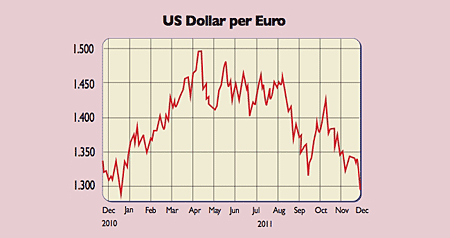
Markets suffered more post-European-summit blues as it became clear that little had changed. Cracks emerged in the new treaty agreement. Four non-eurozone countries said they might join Britain on the sidelines, depending on whether new rules allowing Brussels to police national budgets would apply to the whole EU, or just to the eurozone.
Germany’s chancellor Angela Merkel ruled out increasing the funds of the European Stability Mechanism – the permanent eurozone rescue fund set to begin operations next July – beyond €500bn. Italy was forced to pay a euro-era record of 6.47% to sell five-year bonds on Wednesday. In a reminder of European banks’ precarious position, Germany’s Commerzbank appeared to be heading for another state bail-out. The euro fell to an 11-month low against the dollar.
What the commentators said
Whatever the ultimate impact on Britain of David Cameron’s veto, one thing is clear, said Jeremy Warner in The Daily Telegraph. You may not believe it, given the “fulminating indignation… from across the Channel”, but Cameron did Europe’s leaders a favour last weekend. His veto deflected attention “from the summit’s failure to come up with anything remotely credible” to tackle “the single currency’s existential crisis”.
The new treaty could well never even be written, let alone signed or ratified, said Anatole Kaletsky in The Times. But assuming it is, it essentially just imposes “German austerity on all the other eurozone members”. This will merely exacerbate unemployment and stagnation in the periphery, making it even less likely that these countries can recover from deep recessions, grow their economies and thus reduce their debt loads.
A widely hoped-for ‘silver bullet’ – a major bond-buying programme by the European Central Bank (ECB) – hasn’t arrived. So the hope is that the Bank’s liquidity measures will help by encouraging banks to borrow money for up to three years (at 1%) and invest in higher-yielding government bonds.
But it’s hard to see this back-door tactic working, said Capital Economics. Most eurozone banks’ main concern is finding enough money to roll over debts “and convincing markets that their sovereign exposure is not a huge threat to their solvency”. Are they really going to load up on more sovereign debt?
In the meantime, there’s barely enough money in the rescue funds to cover Italy’s funding needs for two years, said Warner. “My faith in Europe’s ability to sort out its mess grows weaker by the day.”